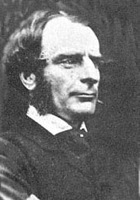A Farewell Poem by Charles Kingsley
A Farewell
I
My fairest child, I have no song to give you;
No lark could pipe to skies so dull and grey:
Yet, ere we part, one lesson I can leave you
For every day.
II
Be good, sweet maid, and let who will be clever;
Do noble things, not dream them, all day long:
And so make life, death, and that vast for-ever
One grand, sweet song.
Summarises the suspicion the English hold for the intellectual. One of their put-downs is 'He is too clever by half'. Yet it did not prevent Shakespeare, Newton and Darwin to appear mysteriously in their midst!
As a schoolboy I had to read some of his poems in my English texts.All his poems were quite accessible to us children. The reason is plain o see - simplicity of presentation and reasoning and easily voiced rhymes. It is not that the British mistrusted intellectuals - some of the greatest post-renaissance intellectuals have been British - but they were generally wary of irrelevant and overweening sophistry. The epithet 'too clever by half' was reserved for people with such predilections. The freedom of expression was nowhere better practised than in England.
It's beyond me that 'A Farewell' constitutes a summary of British attitudes about intellectuals, but then I'm an American, so what do I know about things English? By the way, Shakespeare was truly a literary genius - his star outshone those of Newton and Darwin (?) and whomever you admire!
I love this style of writing - simple, and speaks of simple things, but explains a lot about living.
65 years ago, my mother wrote this poem (second half) in my autograph book and I never really understood it. I was 11 or 12 and was just glad to have her handwriting because she died all too soon of cancer when I was 12. It makes more sense to see it in context with other's remarks. I appreciate it all the more now and will be sure to pass it on when my grandsons have daughters (soon I hope!) . The sentiment is beautiful.
Sweet and lovely advice from a father to his loving daughter. Quite inspiring. Thanks.
This poem is in the book " Best Loved Poems of the American People" by HAZEL FELLEMAN.I have had this book of poems for nearly 50 years-it is a treasure! My grandmother used to recite this poem me.
A primary school teacher wrote the first line of this in my autograph book over 50 years ago, and I have only just by accident found it’s source! At the time I was very upset, I didn’t want to be good, but to be clever! I’ve always remembered it and have spent my life ignoring the advice!
What's the occasion of the parting? The advice is almost like the idea (I think echoed by Nietzsche?) that one should live one's life as though crafting a work of art. Difficult to do on a monday morning in January, when everyone is being grumpy... But not a bad idea

The greatest wish a father could have for his child- that the child live his morals not merely mouth them